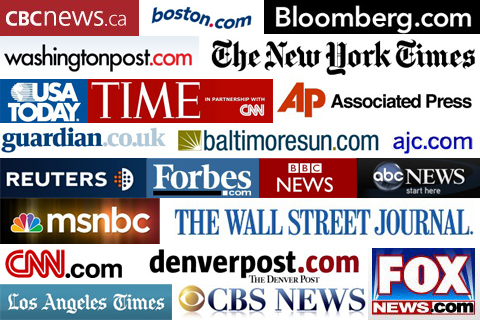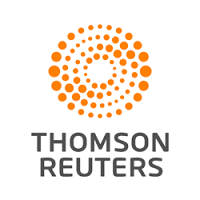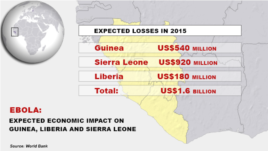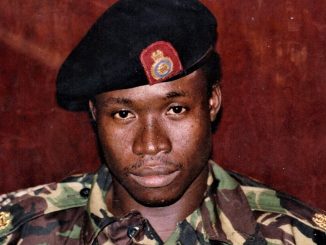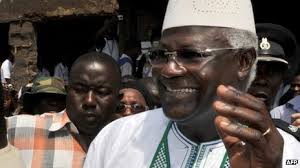
As we indicated in an earlier editorial, the demonstrations against President Ernest Koroma at the Lafayette Park, near the White House and at the World Bank last Friday during the President’s visit did not strike a chord or resonate with the U.S. mainstream media. None has said anything about the demonstrations.
Three top U.S. media went to President Koroma’s hotel and sat down with him and interviewed him on every important topic presently affecting Sierra Leone but none of them mentioned anything about or asked the President any question about the much-touted demonstrations or the dismissal of former Vice-President Alhaji Samuel Sam Sumana. They instead asked the President questions about what they considered more important–The purpose of his trip to the U.S, his Ebola recovery plan and what he expects the international community to do to help Sierra Leone get back on her feet. This should show organizers that their demonstrations went unnoticed, like many of the spurious rallies held everyday in the same locations and the UN.
Asked why no question was asked on the President’s reaction to the demonstrations , A U.S. media expert who also came to the hotel to get news on President Koroma’s visit and the Ebola situation said that the demonstrations were not important enough to deserve coverage. According to him, demonstrations are simply an expression of people’s opinions , which they are entitled to under their First Amendment rights . Demonstrations, he went on, do not constitute a verdict on a leader or a government nor are they capable of spurring foreign policy shifts from governments, especially where there are counter demonstrations . Demonstrations and counter-demonstrations , he went on, are democracy at work and just the outcome of people deciding to exercise their rights to freedom of expression, which is perfectly acceptable in any democracy. The news man said that so many demonstrations take place in the U.S. everyday at the White House, UN, IMF, World Bank , Times Square in New York etc etc and were they all to be covered by the media, newspapers and TV would be full of insignificant and irrelevant news.
It must also be worthy to note that neither CNN nor Bloomberg News , which have a penchant for covering third world events or any of the mainstream U.S. media reported anything about the demonstrations. BBC , the British media that has an anti-government correspondent in Sierra Leone, obviously wrote something on the demonstration but it is also important to note that the BBC described the demonstrators as “OPPONENTS” OF PRESIDENT KOROMA ; not the Sierra Leonean people. The object lesson from the BBC choice of words is that the demonstration was not representative of the views of all Sierra Leoneans. There is no leader in the world without opponents . Therefore, it is not a big deal for a leader’s opponents to stage rallies against him. It is all part of politics. But some people would like to blow these events out of proportion and give them meanings they do not deserve.
Members of the SIERRA LEONEANS FOR PEACE say they are countering the CONCERNED SIERRA LEONEANS’ demonstrations only because they want the world to know that the Concerned Sierra Leoneans do not represent the Sierra Leonean people at large, most of whom still love and trust President Koroma and appreciate what he has done for the country. They want to prove too that there are Sierra Leoneans ready to die for President Koroma, if needs be.
For those wasting their time thinking that these demonstrations will change the attitudes and policies of the U.S. and the international community towards Sierra Leone, they need to be reminded that two years ago Liberians demonstrated against President Ellen Johnson-Sirleaf at the UN during the General Assembly.
I told some of the demonstrators that day on the site that the U.S. already had a good opinion of President Sirleaf based on her socio-economic and political achievements and her respect for fundamental human rights and it was hardly likely that the demonstrations would change anything. Some of them described me as a stooge of the President , but what happened ? Shortly after the General Assembly , U.S. President Obama invited Madam Sirleaf to the White House where he reassured her of the U.S. Government’s commitment to continue helping Liberia’s post-war recovery efforts. Mrs. Sirleaf has been thrice to the White House since that demonstration where Liberians accused her of all manners of economic mismanagement, corruption and human rights abuses. The U.S. and the international community have their own men and women on the ground and they have their own barometers and yardsticks for judging the performance of leaders .They are not easily influenced by dissident opinions and demonstrations .
Let me re-educate Mustapha Wai, Jesmed Suma, Alpha Saidu Bangura, Hsasan Baraka, Fuambai Sia Ahmadu and others once again from what I have learnt working at the UN for the past six years : The international community will only intervene in a country where there are credible and proven cases of serious human rights violations, including genocide and serious threats to international peace and security. The international community knows that all countries have their political differences and problems. The international community is constituted of countries which also have their own internal problems. The community expects countries to deal with their internal problems and not all of these problems are deemed serious enough to warrant international attention and intervention, except where there are proven cases of grave human rights abuses and threats to international peace and security.
President Koroma, during his eight years in power so far, has not been found culpable of any serious violation of the human rights and constitutional rights of the people. Even with the cases of corruption by some unscrupulous officials, these events are counterbalanced by the existence in Sierra Leone of a robust Anti-Corruption Commission and the commitment that President Koroma has been demonstrating towards bringing to justice even his once most favourite officials . It is highly unlikely that the international community will change its mind about him easily now because he dismissed his Vice-President , which matter , to the President’s credit , is now in the hands of the highest court in the land, the Supreme Court. The fact that President Koroma is not interfering at all with the process of the law shows that there is no arbitrary display of power by the President. So how do these people mentioned above think that the international community would suddenly develop negative perceptions about the President and stop dealing with him ? That is not the way International politics and diplomacy operate.
Despite the demonstrations, the World Bank and the Islamic Development Bank committed themselves to provide Sierra Leone significant amounts of money to help in post-ebola recovery. More funds are pending from the IMF and other stakeholders. So what the demonstrations achieve ? NOTHING ! ! !
Essentially, the Sam Sumana case is purely an internal matter that is in the hands of the highest court in the land. So far, it has no bearing on the international community . When the Supreme Court finally decides on the matter, all parties are expected to accept the verdict, because the Supreme Court is constitutionally the last port of legal arbitration and decisions.
READ THE COVERAGE OF PRESIDENT KOROMA’S TRIP AND THE INTERVIEWS AND NOTICE HOW, CONSPICUOUSLY, NOTHING IS MENTIONED ABOUT THE DEMONSTRATIONS. THIS IS ENOUGH TO SHOW SIERRA LEONEANS THAT THE DEMONSTRATIONS WERE NOT DEEMED IMPORTANT OR SIGNIFICANT ENOUGH TO MERIT MENTION :
WASHINGTON (Thomson Reuters Foundation) – The Ebola-stricken nations of West Africa are asking international donors to cancel their debts and give them $5-6 billion over two years to rebuild their economies, devastated by the deadly disease, Sierra Leone’s president said on Thursday.
“Our social services are ruined, our economies have halted, and we need a real Marshall Plan to take us out of the woods,” President Ernest Bai Koroma said in an interview with the Thomson Reuters Foundation.
The leaders of Sierra Leone, Guinea and Liberia will unveil their regional reconstruction program at a meeting on Friday with the heads of the World Bank, the United Nations and the International Monetary Fund.
Koroma said he wants World Bank President Jim Yong Kim to deliver on his promise last year of regional reconstruction on the scale of the Marshall Plan that rebuilt Europe after World War II. The three nations also need about $4 billion in debt forgiveness over and above the relief already provided, he said.
“If that (debt) is canceled and support is provided to our regional program, it will take us a long way forward in our transformation agenda,” Koroma said.
The request is sizable. Already the international community has pledged $5.6 billion to tackle Ebola and the damage it has wrought. More than 10,000 people have died since the virus struck West Africa a year ago and 25,791 people have been diagnosed with the disease, rocking a region still recovering from civil wars.
The number of new Ebola infections has fallen sharply recently, raising prospects for zero infections soon. The World Health Organisation reported 37 confirmed cases in the week to April 12, down from 150 four weeks earlier.
But the social and economic toll has been immense. The healthcare systems collapsed, schools closed, flights were canceled, workers left and unemployment has soared.
Economic output this year is forecast to contract 13 percent in Sierra Leone, 1.4 percent in Liberia and growth to stall in Guinea. The global collapse in commodity prices has ruined their export sectors.
FOOD INSECURITY
Food shortages are worsening. As the disease cut huge swathes through families and villages, farmers were unable to tend their crops. The World Food Programme is providing supplies.
Koroma said he was concerned about the planting season for rice, a staple for his country, and said farmers urgently needed seedlings, equipment and fertilizer within the next few weeks.
“This is very critical,” he said. “We have to move quickly and cut through the bureaucracy.”
The World Food Programme forecasts the number of food insecure people in Sierra Leone, meaning they cannot get enough to eat, will increase by one third to 610,000 this year.
Koroma said the number will be much lower if the country’s farmers do not miss the April-May rice planting season.
The international community already has provided support through healthcare program and IMF credit facilities. But Koroma said that now that the health crisis is ebbing, a regional reconstruction plan led by the World Bank and supported by bilateral and multilateral donors is crucial to put the three countries’ economies onto a secure path.
(Reporting by Stella Dawson; Editing by Tim Pearce and Andrea Ricci)
 Sierra Leone President Bemoans Ebola’s Impact
Sierra Leone President Bemoans Ebola’s Impact
Last updated on: April 15, 2015 10:34 PM
Sierra Leone President Ernest Bai Koroma says the Ebola outbreak has been devastating to his country’s economy, crippling businesses and households. But the country is focused on rebuilding its health system and economy.
His government is considering establishing a Center for Disease Control to help prevent and combat future disease outbreaks. “We will be required to train more of our personnel,” he said in an interview with VOA.
Koroma’s remarks followed a Wednesday meeting at the White House. U.S. President Barack Obama had invited the leaders of the three West African countries hardest hit by the Ebola epidemic – Koroma, Liberian President Ellen Sirleaf and Guinean President Alpha Condé – to assess progress against the disease and toward socioeconomic recovery.
Since the Ebola outbreak began in late 2013 in Guinea, 25,791 cases have been reported, with 10,689 deaths, according to the World Health Organization’s latest report. All but a few infections have occurred in the three countries. Sierra Leone alone had 12,201 reported cases and 3,857 deaths.
While Sierra Leone reported nine new cases last week, the overall caseload is declining and the disease is fading from the region.
Koroma told VOA the outbreak undermined his government’s efforts to boost and restructure the economy after years of civil war.
“As a result of Ebola, most businesses shut down,” he said. “A good number of the mining companies ceased operations, flights were canceled to the country, tourism was almost brought to a standstill, and even within the country, businesses that were operating scaled down substantially.”
“So, there was a considerable slowdown in the economy; loss of revenue to government, loss of revenue to individuals and businesses and the country was more or less isolated. Nobody ventured in, nobody will discuss business at this time,” Koroma added.
The World Bank estimated that Ebola will cost the three West African countries at least $1.6 billion in lost economic growth this year alone.
Koroma, speaking after meeting with U.S. President Barack Obama at the White House on Wednesday, said he was grateful for U.S. assistance to help combat Ebola.
The Sierra Leonean leader said Obama assured him that he’s committed to help the West African nation fight the deadly disease. He added the U.S. president said he was “also prepared to provide support to us in our recovery programs, and in our post-Ebola economic development proposals.”
Koroma said that at the height of the Ebola outbreak last year, his country’s only visitors were officials or representatives from international health organizations, nongovernmental organizations, and representatives of financial institutions such as the African Development Bank and the World Bank.
The disease has damaged the entire West African region, Koroma said. Neighboring Liberia and Guinea are the two other countries most severely affected.
Koroma said his government plans to revamp its health system. That includes establishing a Center for Disease Control to help train health officials to be better equipped to combat future disease outbreaks.
“It will also require us to ensure that we put in systems that will focus on isolation, prevention and strengthen our capacity to track diseases. Not only to finish up the fight against Ebola, but also to ensure that we develop the capacity that will enable us to fight back any future outbreak.”
Shaka Ssali’s interview with President Ernest Bai Koroma of Sierra Leone
 Sierra Leonean president looking past Ebola to broad national recovery
Sierra Leonean president looking past Ebola to broad national recovery
 Sierra Leonean President Ernest Bai Koroma was ready to talk about something besides Ebola.
Sierra Leonean President Ernest Bai Koroma was ready to talk about something besides Ebola.something besides Ebola.
His West African nation is not yet Ebola-free. It is still fighting to rid itself of the feared pathogen, which has killed more than 10,000 people in that country and Guinea and Liberia since March 2014. But the number of new Ebola cases in Sierra Leone has slowed to a trickle. The country had seven new confirmed infections last week. In November, it was recording 550 new cases a week.
“With the slower pace,” Koroma said, “we are given space to look beyond Ebola.”
Looking beyond Ebola is the main goal of Koroma’s current visit to Washington. He and other leaders from the worst Ebola-stricken nations met with President Obama on Wednesday. On Friday, Koroma and the others will visit the World Bank to talk with finance and development officials.
Koroma told The Washington Post that he is seeking assurances that the world will help Sierra Leone and the other nations regain their economic footing from the devastating blow of Ebola.
Recovering from one of the most fearsome infections known to humankind should provide a time of unsurpassed joy. But it doesn’t always work out that way. VIEW GRAPHIC
Even before Ebola, Sierra Leone was one of the world’s poorest countries. But as fear surged last year, many of the nation’s iron ore mines — which together are a major employer and a source of tax revenue — shut down. Farmers feared tending their fields. Efforts to curtail the outbreak led to interruptions in harvesting and planting. Small businesses suffered as even the most common transactions seemed infused with risk.
Sierra Leone’s economy had been booming. The nation was predicted by the Economist magazine to be among the fastest-growing in the world in 2014. But that was before Ebola.
Koroma said he wants to focus on four areas. First, he wants to reopen the nation’s schools, which were closed in September. Students began returning on Tuesday.
Second, he wants to rebuild the nation’s health system. Fear of Ebola infection led patients and medical workers to avoid hospitals and clinics. The disease killed 11 doctors in a nation with only an estimated 134 doctors for 6 million residents. Koroma said he hopes to speed up the training of new doctors and nurses. But his country still will need help from foreign medical groups.
“We are seeking funding from outside, from our bilateral friends,” Koroma said. “That is one of the reasons we are here.”
Koroma’s third major objective is to support what he calls “social protection programs” aimed at helping people who survived Ebola as well as the families of those who died from the disease.
His fourth main objective, he said, presents his biggest task: getting business back on a solid footing. “We need to restart the economy,” Koroma said.
Sierra Leone faces a long road. Airlines still have not resumed all flights to West Africa, and it is hard to imagine tourists returning anytime soon. Mines closed by Ebola fears might remain shut because of the low price of iron ore.
Koroma said that ending the Ebola outbreak — as measured by no infections for 42 days — remains the top priority. But he said he can see a time when that will be possible.
“The country is opening up for business once more,” he said, adding, “It is beginning to look up.”
Todd C. Frankel is a reporter covering people and policy. You can follow him on Twitter: @tcfrankel.
something besides Ebola.
His West African nation is not yet Ebola-free. It is still fighting to rid itself of the feared pathogen, which has killed more than 10,000 people in that country and Guinea and Liberia since March 2014. But the number of new Ebola cases in Sierra Leone has slowed to a trickle. The country had seven new confirmed infections last week. In November, it was recording 550 new cases a week.
“With the slower pace,” Koroma said, “we are given space to look beyond Ebola.”
Looking beyond Ebola is the main goal of Koroma’s current visit to Washington. He and other leaders from the worst Ebola-stricken nations met with President Obama on Wednesday. On Friday, Koroma and the others will visit the World Bank to talk with finance and development officials.
Koroma told The Washington Post that he is seeking assurances that the world will help Sierra Leone and the other nations regain their economic footing from the devastating blow of Ebola.
Recovering from one of the most fearsome infections known to humankind should provide a time of unsurpassed joy. But it doesn’t always work out that way. VIEW GRAPHIC
Even before Ebola, Sierra Leone was one of the world’s poorest countries. But as fear surged last year, many of the nation’s iron ore mines — which together are a major employer and a source of tax revenue — shut down. Farmers feared tending their fields. Efforts to curtail the outbreak led to interruptions in harvesting and planting. Small businesses suffered as even the most common transactions seemed infused with risk.
Sierra Leone’s economy had been booming. The nation was predicted by the Economist magazine to be among the fastest-growing in the world in 2014. But that was before Ebola.
Koroma said he wants to focus on four areas. First, he wants to reopen the nation’s schools, which were closed in September. Students began returning on Tuesday.
Second, he wants to rebuild the nation’s health system. Fear of Ebola infection led patients and medical workers to avoid hospitals and clinics. The disease killed 11 doctors in a nation with only an estimated 134 doctors for 6 million residents. Koroma said he hopes to speed up the training of new doctors and nurses. But his country still will need help from foreign medical groups.
“We are seeking funding from outside, from our bilateral friends,” Koroma said. “That is one of the reasons we are here.”
Koroma’s third major objective is to support what he calls “social protection programs” aimed at helping people who survived Ebola as well as the families of those who died from the disease.
His fourth main objective, he said, presents his biggest task: getting business back on a solid footing. “We need to restart the economy,” Koroma said.
Sierra Leone faces a long road. Airlines still have not resumed all flights to West Africa, and it is hard to imagine tourists returning anytime soon. Mines closed by Ebola fears might remain shut because of the low price of iron ore.
Koroma said that ending the Ebola outbreak — as measured by no infections for 42 days — remains the top priority. But he said he can see a time when that will be possible.
“The country is opening up for business once more,” he said, adding, “It is beginning to look up.”
Todd C. Frankel is a reporter covering people and policy. You can follow him on Twitter: @tcfrankel.
something besides Ebola.
His West African nation is not yet Ebola-free. It is still fighting to rid itself of the feared pathogen, which has killed more than 10,000 people in that country and Guinea and Liberia since March 2014. But the number of new Ebola cases in Sierra Leone has slowed to a trickle. The country had seven new confirmed infections last week. In November, it was recording 550 new cases a week.
“With the slower pace,” Koroma said, “we are given space to look beyond Ebola.”
Looking beyond Ebola is the main goal of Koroma’s current visit to Washington. He and other leaders from the worst Ebola-stricken nations met with President Obama on Wednesday. On Friday, Koroma and the others will visit the World Bank to talk with finance and development officials.
Koroma told The Washington Post that he is seeking assurances that the world will help Sierra Leone and the other nations regain their economic footing from the devastating blow of Ebola.
Recovering from one of the most fearsome infections known to humankind should provide a time of unsurpassed joy. But it doesn’t always work out that way. VIEW GRAPHIC
Even before Ebola, Sierra Leone was one of the world’s poorest countries. But as fear surged last year, many of the nation’s iron ore mines — which together are a major employer and a source of tax revenue — shut down. Farmers feared tending their fields. Efforts to curtail the outbreak led to interruptions in harvesting and planting. Small businesses suffered as even the most common transactions seemed infused with risk.
Sierra Leone’s economy had been booming. The nation was predicted by the Economist magazine to be among the fastest-growing in the world in 2014. But that was before Ebola.
Koroma said he wants to focus on four areas. First, he wants to reopen the nation’s schools, which were closed in September. Students began returning on Tuesday.
Second, he wants to rebuild the nation’s health system. Fear of Ebola infection led patients and medical workers to avoid hospitals and clinics. The disease killed 11 doctors in a nation with only an estimated 134 doctors for 6 million residents. Koroma said he hopes to speed up the training of new doctors and nurses. But his country still will need help from foreign medical groups.
“We are seeking funding from outside, from our bilateral friends,” Koroma said. “That is one of the reasons we are here.”
Koroma’s third major objective is to support what he calls “social protection programs” aimed at helping people who survived Ebola as well as the families of those who died from the disease.
His fourth main objective, he said, presents his biggest task: getting business back on a solid footing. “We need to restart the economy,” Koroma said.
Sierra Leone faces a long road. Airlines still have not resumed all flights to West Africa, and it is hard to imagine tourists returning anytime soon. Mines closed by Ebola fears might remain shut because of the low price of iron ore.
Koroma said that ending the Ebola outbreak — as measured by no infections for 42 days — remains the top priority. But he said he can see a time when that will be possible.
“The country is opening up for business once more,” he said, adding, “It is beginning to look up.”
Todd C. Frankel is a reporter covering people and policy. You can follow him on Twitter: @tcfrankel.

